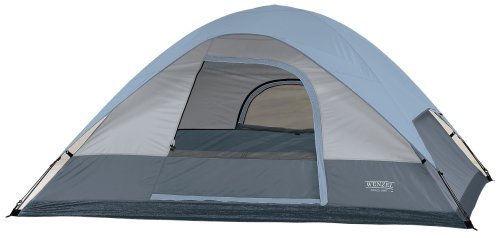TENT, TIMBER RIDGE SPORT DOME, 9 X 7
 NULL
NULLFor a change of pace to traditional camping, there is nothing like winter camping in the snow. If you prepare correctly, it can be just as rewarding and comfortable as camping during normal camping season. Key to comfort is knowing food and water essentials in addition to having the proper camping equipment and camping gear.
First of all, you need substantially more calories than you do during regular camping. For most people, around 4500 calories plus will give you the energy you need to maintain warmth and stay strong during hiking and normal camping activities. In terms of weight, that is about 2 plus pounds of food per person per day. However, with the cold of winter camping your appetite is less so it's important to plan out a full menu and make it very appetizing.
The type of food you take is also very important. At least one third of your diet should be from fats. Fats digest slower and maintain energy levels over time. Carbohydrates are also very important of quick energy. Be careful of simple carbohydrates such as sugar, brown sugar, honey, etc. These give a quick boost of energy but result in your energy level dropping off quickly to below what it was to start with. Eat complex carbohydrates such as pasta, grains, fruits and starchy vegetables.
The timing and type of your meals is also important. Eat more frequently, every two hours for example. This will help maintain energy levels and also conserve your energy by avoiding big elaborate meals that take up time, energy and fuel to prepare. Additionally, start out with a carbohydrate rich diet early in the day moving towards a fat rich meal later in the day. Since fat takes longer to digest, it will help maintain body heat during the night. A bed time snack is also important such as salami and cheese to keep you well fueled through the night.
Be sure to keep well hydrated. The simple act of breathing causes us to loose moisture even though its cold out. It's also important to make sure your drinking supply doesn't freeze over. Keep containers insulated where possible and take a small bottle with you in your sleeping bag at night. If it's extremely cold, keep your water container upside down so as not to freeze the opening. If you need to melt snow, be sure to have a small amount of liquid in the pan before melting to avoid the scorching taste when melting snow. If you add some lemonade mix, these also tend to freeze at lower temperatures. For food, make sure you cut pieces in small bite sized pieces that will be easier to thaw if they should become frozen. Avoid fresh fruit since these tend to easily freeze.
Now that you've got the tips to keeping warm, make sure you use that sock hat. Most heat escapes out the top of your head. This is especially critical when sleeping.
Summary
As outlined above, winter camping and snow camping can be a great change of pace and well worth the effort if you plan correctly. Food and water remain central to the idea of being well equipped. The proper food and water preparation plus the correct camping gear can make for an enjoyable experience. Tents, sleeping bags and stoves are considered camping equipment but good planning is as well.
Shop 4 Camping Gear is a full line of camping equipment and information. Visit our web site at http://www.shop4campinggear.com

0 Comments:
Post a Comment
<< Home